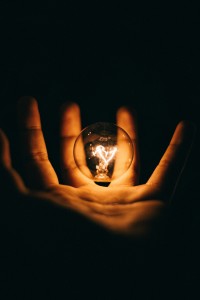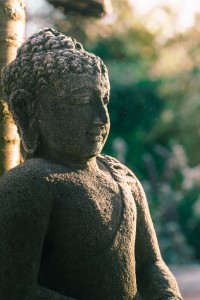 One of the most common challenges for new meditators is getting sleepy, or actually falling asleep while meditating.
One of the most common challenges for new meditators is getting sleepy, or actually falling asleep while meditating.
When students ask me what to do about this, the first thing I usually say is that meditation is like a mirror.
If we’re falling asleep while meditating, this usually means something about our lifestyle is causing it. Maybe we have poor sleep habits, we’re overworking ourselves, have a hyperactive mind or lots of stress, our diet or exercise habits are imbalanced, etc. Just like looking in the mirror, noticing these things is powerful information we can use to make real changes.
However, even if we did everything right, we’re likely to have some days when we’re sleepy. So what to do during meditation when this happens? There are three basic options.
 1) Prioritize Awareness
1) Prioritize Awareness
Standing up is the best method for instantly overcoming sleepiness, and having a lucid, alert awareness. Everyone always focuses on sitting meditation, but I promise that standing meditation is just as good. The reason people don’t do it much is because it takes more energy, but that’s exactly the reason it works when you’re sleepy!
Otherwise, you can get a roughly 20% awake-ness boost through opening your eyes, and another 20% boost from conscious breathing (just a simple 4 count inhale, 4 count exhale is good).
I’ve tried many other tactics, but those three are far and away the best.
 2) Prioritize Attitude
2) Prioritize Attitude
This is all about developing equanimity, or non-reactivity, to your present experience.
While people generally focus on awareness, I’ve personally found people’s lives more radically improved by deeply learning equanimity. In other words, regardless of how lucid your awareness is, you’re doing really well if you can come into deeper layers of acceptance!
How does this work?
For starters, closely notice how you’re relating to your sleepiness. Are you getting irritated or frustrated? Do you think your meditation is a waste if you can’t be fully awake? Do you dislike how it feels, or wish it were something different? Do you have a sense of resistance or aversion towards the experience?
Whatever you notice, see if you can radically accept your experience as it is. The unpleasant feelings. The hazy mind. The wandering thoughts. Even allow the resistance itself!
If you can’t seem to be equanimous towards the sensations, haziness, thoughts or resistance, just acknowledge to yourself, “right now, I’m in a state of resistance, etc.” Acknowledging things as they are is the birthplace of equanimity.
What about kindness?
While equanimity is the core attitude for meditation, I’ve seen many students unknowingly develop it in a way that’s colored with self-hatred. Do yourself a HUGE favor, and have a little compassion on yourself! Meditation is not an easy thing. Just the fact that you’re trying it is a huge accomplishment. You’re on your path, and you’re doing alright – I promise!
 3) Prioritize wisdom.
3) Prioritize wisdom.
Wisdom is all about understanding that helps us develop inner freedom. One of the best gateways to wisdom is what’s called investigation or inquiry (dhamma-vicaya).
For example, you might get curious about the actual experience of sleepiness, and shift your primary focus to the quality of body sensations, feelings or thoughts associated with sleepiness. Similarly, you could try out some of the following specific inquiries:
- What is sleepiness like?
- How specifically do I know I’m sleepy?”
- Is my awareness truly 100% hazy – or are there little moments of lucidity and clarity?
- How do I tend to instinctively react to the experience of sleepiness?
You could make these sort of investigations the primary focus of your meditation; or, you could continue with your typical practice, and just let these questions passively rest in the back of the mind.
It’s important to note that investigation isn’t a verbal process. It means investigating with awareness, seeing things closely – not thinking about them. Some thoughts are okay and even helpful (a question is a thought!), but if your mind starts going in circles, it’s helpful to take a couple breaths, relax, and back off a little bit.
How does this type of understanding lead to inner freedom?
Knowledge is power. The more deeply we understand how our mind & body work, the more choice we have in how we show up in the world. It might seem trivial to say that something like sleepiness has valuable information for us, but every experience is rooted in the same principles, which makes sleepiness just as good as any other experience!
 How Do I Know Which Of These Three Options To Prioritize?
How Do I Know Which Of These Three Options To Prioritize?
Over time, it can be helpful to get familiar with all three of these options. One of them isn’t any better or worse than the others. Each has its own unique speciality.
However, I usually suggest people begin with attitude – just relax, allow and give their experience radical permission to be. This could be done in combination with the awareness boosts, or just by itself. You could also begin with the awareness stuff, and follow with the others. The wisdom one is usually a little more confusing until you’ve been meditating for a while.
As a final note, don’t be too hard on yourself about doing the right practice. Just the fact that you’re meditating, and being with your sleepiness for a moment is huge! Over time, you’ll slowly start to develop an intuition for what serves you the most.
